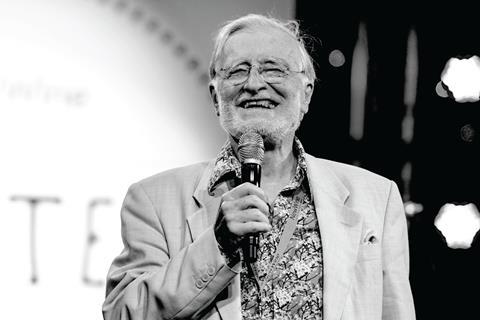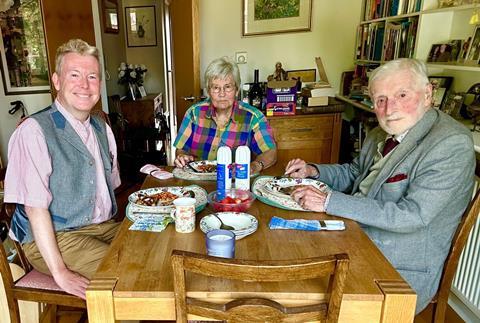Rt Rev David Pytches, founder of New Wine and former vicar of St Andrews, Chorleywood, has died aged 92. Greg Downes pays tribute to a pioneer of charismatic renewal within the Anglican church

The UK Church has lost a general in the faith or, as I referred to him in a Facebook post earlier this year, a national treasure.
Since his death on Tuesday, social media has been filling up with tributes to a man who was perhaps the most significant figure in British charismatic Christianity in the past half century.
Much has already been said about the kindness, humility and impish sense of humour of this remarkable man who was a fearless pioneer and divine disrupter. I wish to offer a personal perspective based on five experiences I had with him over the past two decades.
The apostolic leader
Though I knew of David and had read his books, I first met him when he attended a seminar I was giving at a Soul Survivor festival around 20 years ago. He was very encouraging about what I shared (as he was with so many) and, after that time, seemed to champion me to others and encourage me as a young minister at any opportunity.
He had an innate ability to discern, disciple and deploy leaders - a gift I believe is part of the apostolic. I was the beneficiary of his ‘Barnabas anointing’ just last year, when I preached at St Andrews, Chorleywood. An elderly, frail David Pytches was sat at the back as I delivered my sermon. I said something controversial and, of course, he loved it and was full of affirmation. His encouragement meant a lot to those who knew him, as he didn’t suffer fools gladly!
For him, to be an evangelical was also to be a Charismatic, because he understood the scriptures to point to the presence and power of the Holy Spirit
His apostolic leadership was demonstrated not just in his founding of the New Wine movement but in his extraordinary leadership of St Andrews Church, Chorleywood, then the preeminent charismatic evangelical church of its day. David was a great gatherer and, when he was vicar of St Andrews, everyone on the staff team seemed to have a ministry well beyond the boundaries of the parish, whether it was writing books or speaking at conferences.
On more than one occasion he repeated to me: “The secret of successful leadership is really quite simple - just appoint people better than you!”
The storyteller

David was an inspirational leader and one of his chief means of motivating and inspiring people was through storytelling. He didn’t claim to be a great theologian but his simple, direct preaching, peppered with self-deprecating humour and holy ghost stories inspired me - and so many others - to chase after God.
When I was the director of the Centre for Missional Leadership in Watford (then London School of Theology’s second campus), I invited David to lecture there. He stuck lightly to the brief I had given him but, like a spiritual Yoda, he kept students spellbound with his incredible true life stories of seeing the kingdom of God break in.
He didn’t speak for his full allotted time, instead allowing for a prayer ministry time in which he anointed students with oil. Many were visibly moved as they were filled with the Holy Spirit and empowered to live out the mission of God in their respective callings. It was John Wesley who said: “All true divinity is practical divinity” - and this was a pure masterclass in that.
The maverick missionary
David and his wife Mary were veteran missionaries in South America, with David having been the one time Bishop of Chile, Bolivia and Peru. He possessed the natural ability to transpose himself, without compromise, to many different contexts so he could be effective as an ambassador for Christ.
When I was chaplain at Pembroke College, University of Oxford, I invited him to preach at Choral Evensong, a traditional context that some evangelicals would not be at ease in. Not so David. Afterwards, he kept his purple cassock on to dine at high table during formal Hall. This was not my practice (but I followed suit); he intuitively knew what the occasion demanded.
David’s maverick tendencies were also expressed in being the ordaining Bishop at ordinations that were deemed “legal but irregular”, and his pioneering church planting - sometimes planting churches outside his own parish. Acknowledging that David was a Bishop now running a parish, it was recorded in the authorised biography of Most Rev Robert Runcie, former Archbishop of Canterbury, that Runcie was known to refer to “the Diocese of Chorleywood.”
He was no fan of the English parochial system, once commenting: “When it comes to church planting, the parish system is the condom of the Church of England.” For David, missional expediency always trumped ecclesiastical tradition.
Father in the faith
I sent David a birthday card a couple of years ago: “‘Though you have ten thousand teachers in Christ, you do not have many fathers’ (1 Corinthians 4:15). Happy 90th birthday! Thank you for being one of the few ‘fathers’ in the faith - to me and to so many.”
The secret of successful leadership is really quite simple -just appoint people better than you!
David was that rare specimen of a minister who was a true father in the faith.
It is notable that Mike Pilavachi, who stepped down from his role at Soul Survivor following abuse allegations which were later substantiated by the Church of England, has broken his social media silence in order to pay tribute to David, saying: “He was a spiritual father. He was so secure in his calling and in his relationship with the Lord that others flourished around him.”
David’s calling as a father in the faith was brought home to me many years ago when I resigned from my job (which was not working out) to relocate to Cornwall with my wife, who works as a naval doctor and to study for my PhD. I was disillusioned and depressed and became increasingly isolated. David not only phoned regularly to see how I was, but actively tried to help me get another job (I declined). This was the darkest season of my life and it was notable to me who didn’t seem to bother with me once my vocational path stalled. Yet David remained interested and concerned. I will be grateful to him for that as long as I live.
The guardian of orthodoxy
I shall miss my convivial conversations with David, which invariably centred around theology, ecclesiology, revival, charismatic renewal and evangelism. David took a keen interest in theology and was concerned at the trajectory of the Church of England, something he expressed to me in our last meeting in June this year. Consecrated as a Bishop in the Anglican Church, he took seriously the peculiar promise all bishops make to “drive away strange doctrine”.
David was not just a man of the Holy Spirit but of the Word of God. For him, to be an evangelical was also to be a charismatic, because he understood the scriptures to point to the presence and power of the Holy Spirit. And, according to the very same scriptures, the indwelling Holy Spirit leads us into all truth.
In an age when many are tempted to opt either for a sectarian, fundamentalist Christianity or an increasingly liberal mysticism, perhaps David Pytches’ greatest legacy will be modelling a different way for us.






































No comments yet